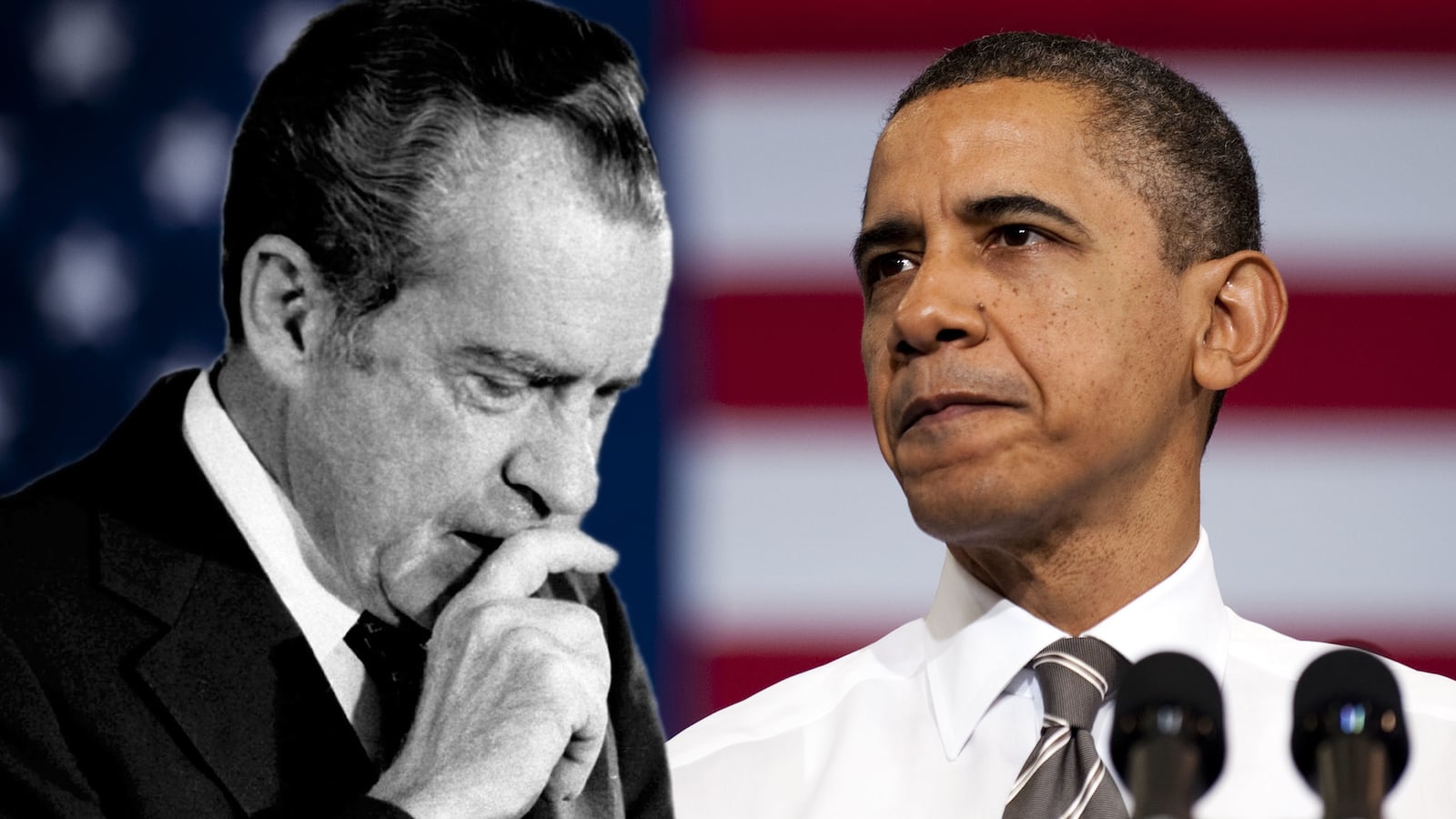Forty years after Richard Nixon resigned from office, talk of impeachment is once again in the air. But fortunately for all of us, it’s just talk, nothing more. Democrats bandy the “I” word to scare-up campaign dollars, Sarah Palin and Michele Bachmann kick the word around because they have nothing to lose, and the Republican base dreams of impeachment because of who they are. At least House Speaker John Boehner and the rest of the country aren’t buying into this nonsense.
Still, things feel more acrid than they were during Impeachment Summer. Back then, there was a bipartisan national consensus that Nixon had to go. Within the House Judiciary Committee, six Republicans voted with 21 Democrats to impeach the president. Outside the committee room, then-Vice President Gerald Ford and House Majority Leader Tip O’Neil even managed to go golfing together – as they always had done. Even Sen. Barry Goldwater, the father of the modern conservative movement, went to the White House and told Nixon that it was time to go.
But today, four decades later, America acts as if it is permanently at war with itself. Consensus is a rarity. When President Obama golfed with the Speaker, it was a staged event.
To be sure, Watergate’s legacy was not the death of bipartisanship. No, the end of the Cold War and changing demographics had a greater hand in that. As the President acknowledged to The New York Times, the tectonic shifts of diversity bring their own political challenges, both here and in the Middle East.
Instead, the 1972 break-in of Democratic National Committee marked the end of something related, but not identical: trust in government. Even after the Kennedy and King assassinations, our cities having gone up-in-arms and in flames, and even after the Vietnam War, America had not yet shed its belief in government’s capacity to get things right every now and then. Then Watergate came along and changed all that.
Since then, America has come to distrust government, predictably and almost continuously. It’s especially interesting that there are sharp differences between whites and minorities on that question, as less than 10 percent of whites trust the government on a consistent basis.
According to a recent Pew Poll, white and non-white Millennials have distinct and divided takes on the role of government. White Millennials preferred a smaller government, while non-white Millennials wanted the opposite. Significantly, the outlook of Millennials on activist government didn’t differ all that much from their parents, according to Pew. And in case anyone forget, in 2012 white voters went for Mitt Romney by an almost three-to-two margin, after having given Obama a larger share of its vote than it gave to John Kerry in 2004.
The bottom line is that America is organically divided. In his New York Times interview, Obama trotted out the usual trope about “our politics are dysfunctional,” and for good measure also blamed the Republicans and gerrymandering for our ills. But in his next breath he got serious, comparing divisions at home to those among Shias, Sunnis, and Kurds, and acknowledged that diversity cannot be read out of the equation in explaining where the nation stands.
“Societies don’t work if political factions take maximalist positions. And the more diverse the country is, the less it can afford to take maximalist positions,” said Obama; so much for there being no red or blue America.
As Reagan White House veteran James P. Pinkerton observes, “The Democrats won big partisan victories in ’06 and ’08, but there was no sustained shift to the left. Without a doubt, America is more libertarian today on social issues, but it is not further to the left on economic issues.”
And why is that? Pinkerton explains: “The ideology of multiculturalism and the demography of immigration have eroded the sort of social solidarity that’s needed to support a leftward shift.”
So today, gridlock in Washington simply mirrors who we are and where America is. The numbers say that congressional Democrats are disfavored by a plurality of Americans, that the congressional GOP is disliked by a majority of the country, and that Obama‘s popularity is at a nadir.
Polls also tell us that our citizens do not see the world through similar eyes. When asked about what matters most to them, conservatives’ top policy and word-choices included following the Constitution, stopping abortion, impeaching the president, and halting illegal immigration. Liberals focused on stopping Republicans, Congress doing its job, and amnesty for immigrants. Despite Obama acknowledging that diversity brings its own tensions, the President and his party continue to plug away for open borders, acting as though diversity for its own sake is an unalloyed good, and then recoiling in horror at the face of pushback.
Ironically, the Nixon era marked a political arcadia, of sorts. Nixon won reelection with a popular landslide, a feat since pulled off by only Ronald Reagan in 1984. Likewise, Nixon’s impeachment shared the virtue of similarly transcending party and region. Indeed, it was a living history and civics lesson.
Back then, Southern Democrats like Walter Flowers of Alabama and James Mann of South Carolina managed to find common ground with the likes of Hamilton Fish, a New York Republican, whose namesake served as Ulysses S. Grant’s Secretary of State. Virginia Republican Caldwell Butler, who just died last month and whose ancestors included a Confederate General who received a death bed promotion from Stonewall Jackson, made common cause with Texas Democrat Barbara Jordan, who descended from sharecroppers, tenant farmers, and former slaves.
In supporting impeachment, Jordan announced, “My faith in the Constitution is whole; it is complete; it is total.” Words like that are still easy to find, but that kind of faith is much harder to believe or to have in 2014. With each election feeling like a Civil War reenactment, Jordan’s sentiments are really words from a bygone era.





